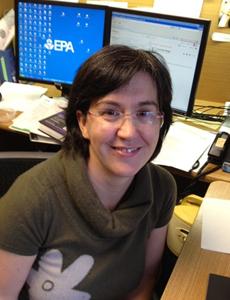Meet EPA Scientist Ana Rappold, Ph.D.

The Impacts of Air Quality on Human Health
EPA Scientist Ana Rappold is a statistician in EPA's Environmental Public Health Division of the National Health and Environmental Effects Research Lab. Prior to her work there, she spent several years as a Post Doc at EPA's National Exposure Research Laboratory. Her research is focused on the health effects of air pollution.
How does your science matter?
My research focuses on the health effects of air pollution. Together with my colleagues, I study how sensitive populations, such as asthmatics, are affected by air pollution. We study changes in biological markers in response to daily variation in air pollution. Examples of biological markers are lung function, heart rate variability, and inflammatory markers in blood. We then contrast these responses between healthy individuals and those with asthma to provide insights to how and why air pollution affects our health.
Another portion of my work focuses on the effects of wildfires on heart and lung health. Wildfires are a major source of air pollutants and contribute massive amounts of fine particulate pollution to the environment. We are interested in ways that we can inform the public, as well as sensitive groups, about the ways of reducing adverse health impacts.
I genuinely believe that EPA’s work matters and I am glad to be a part of it. It’s evident that it matters when we look at air pollution levels in the United States before and after EPA. EPA has helped reduce pollution in many parts of the country. More work is still necessary, but we have many success stories and must continue this work.
Every scientist works on a small piece of the big picture. I’d like to believe what I do also becomes part of that larger picture.
If you could have dinner with any scientist, past or present, who would you choose and what would you ask them?
I was born and raised in Croatia. I studied math at a technical school, the equivalent of high school in the US, which was named after Nikola Tesla. Yes, we did have a lot of physics and electronics. There are a lot of unusual stories about Tesla, but however unusual he might have been, he made an impact on all of our lives and possibly changed the course of history. He had an inspiring vision. If I could meet him in the park or over dinner, I would love to see what he thinks about connectivity in today’s world.
What do you like most about your research?
I like that I work on topics that are important because of their real-life applications. We’re all likely to be impacted in our lifetime by air pollution, and some people are more affected than others. Understanding how susceptible populations are affected, like asthmatics, is a challenging question. I also really like the people with whom I work.
Tell us about your background.
I received my Bachelors degree from the University of North Carolina at Chapel Hill where I studied Operations Research, which is one of Mathematical Science. Then, I went to Duke University where I received my Ph.D. in Statistics and Decision Sciences.
How did you get started at EPA?
I started as a post doctoral fellow working on predicting levels of air pollution around the country at different points in time. I really wanted to work with the health side of the equation, so I moved to NHEERL. Eventually I was hired into my current position.
When did you first know you wanted to be scientist?
When I was very young, I wanted to be either a teacher or mathematician. In terms of applied sciences, I only became aware of those opportunities in college when my horizons expanded from academic knowledge to the real world.
If you were not a scientist, what would you be doing?
I've always liked math a lot, so I would be a math or statistics teacher. If I didn't like math I would have liked arts and music, so maybe a rock star.
Any advice for students considering a career in science?
I think you really have to have your heart in it and passion to carry your project forward. It's also important to find an advisor with whom you can work well and is a good match for you.
